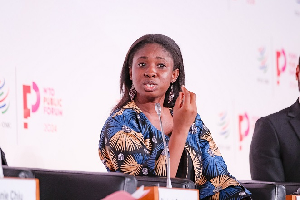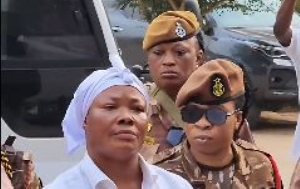Stephanie Eyram Akrumah, Director of the Centre for Green Growth, has urged the World Trade Organisation (WTO) to create unified trade standards that better include the Global South.
Speaking at a high-level panel hosted by the WTO on "Re-globalizing Trade for an Inclusive Tomorrow: Youth Perspective," Akrumah emphasized that current environmental, governance, and social (ESG) frameworks disproportionately impact developing nations, making it difficult for them to compete under existing regulations.
At the event held in Switzerland, Geneva, on September 13, 2024, she called on the WTO to lead efforts in building non-conflicting global standards that ensure equitable participation for all.
“Trade needs to work for everybody,” Akrumah stated.
She highlighted the growing challenges faced by countries in the Global South, who often struggle to keep up with evolving trade standards largely developed by the Global North. According to her, environmental and economic frameworks such as the EU taxonomy and the Sustainable Finance Disclosure Regulation (SFDL) are increasingly posing barriers for organizations in developing nations.
"We send produce to parts of Europe, and we have to deal with these standards," Akrumah noted, pointing to how local exporters face difficulties in adapting to ESG requirements that are often out of reach. "These standards are taking out a number of organizations who would ordinarily have entered into the market with the current standards they have, but now must adapt or risk exclusion."
Akrumah stressed that the lack of inclusivity in trade discussions puts the Global South at a disadvantage. "When initiatives and decisions around trade are not taken with inclusivity in mind, when the different parties are struggling with different issues, it becomes difficult for those in the Global South to participate actively," she said.
The WTO, in Akrumah’s view, is in a prime position to address these disparities.
"There is a huge opportunity for the WTO to correlate that, build a standard that we can all work with," she noted. "How do we build and integrate a non-conflicting platform, especially with WTO’s central position, to affect the Global South’s inclusiveness and standardize everything?"
Her remarks come as the world confronts a complex web of economic, environmental, and social challenges. Akrumah urged the WTO to use its global influence to bridge the gap between the Global North and South, particularly in trade and environmental governance.
The panel, moderated by Nicolas Albertoni, Uruguay’s Deputy Minister of Foreign Affairs, brought together young entrepreneurs and activists from around the world to discuss how to shape a more sustainable and inclusive global economy. A recurring theme was the need to address protectionism and enhance collaboration to build a fairer global trading system that works for all.
Akrumah's comments highlighted the urgent need for reforms in international trade policies, calling on the WTO to lead efforts to develop a unified global framework that supports sustainable economic growth and ensures that future generations are not left behind.
BB
Business News of Monday, 16 September 2024
Source: www.ghanaweb.com













